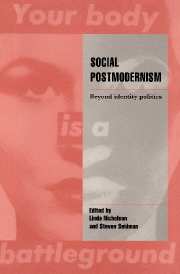Book contents
- Frontmatter
- Contents
- Notes on contributors
- Acknowledgements
- Introduction
- Part I Critiques of identity
- Part II Critiques of the deconstruction of identity
- Part III Postmodern approaches to the social
- 7 Gender as seriality: thinking about women as a social collective
- 8 Refiguring social space
- 9 Just framing: ethnicities and racisms in a “postmodern” framework
- 10 Politics, culture, and the public sphere: toward a postmodern conception
- Part IV Postmodern approaches to the political
7 - Gender as seriality: thinking about women as a social collective
Published online by Cambridge University Press: 29 October 2009
- Frontmatter
- Contents
- Notes on contributors
- Acknowledgements
- Introduction
- Part I Critiques of identity
- Part II Critiques of the deconstruction of identity
- Part III Postmodern approaches to the social
- 7 Gender as seriality: thinking about women as a social collective
- 8 Refiguring social space
- 9 Just framing: ethnicities and racisms in a “postmodern” framework
- 10 Politics, culture, and the public sphere: toward a postmodern conception
- Part IV Postmodern approaches to the political
Summary
In the summer of 1989 I worked in Shirley Wright's campaign for a seat on the Worcester School Committee. Shirley is African-American in a city where about 5–7 percent of the population are African-American, and 7–10 percent are Hispanic. As in many other cities, however, more than 35 percent of the children in the public schools are black, Hispanic, or Asian, and the proportion of children of color is growing rapidly. For more than ten years all six of the school committee seats have been held by white people, and only one woman has served, for about two years. In her announcement speech Shirley Wright pledged to represent all the people of Worcester. But she noted the particular need to represent minorities, and she also emphasized the importance of representing a woman's voice on the committee.
A few weeks later a friend and I distributed Shirley Wright flyers outside a grocery store. The flyers displayed a photo of Shirley and some basics about her qualifications and issues. In the course of the morning at least two women, both white, exclaimed to me, “I'm so glad to see a woman running for school committee!” This African-American woman claimed to speak for women in Worcester, and some white women noticed and felt affinity with her as a woman.
This seemed to me at the time an unremarkable, easily understandable affinity. Recent discussions among feminists about the difficulties and dangers of talking about women as a single group, however, make such incidents appear at least puzzling.
- Type
- Chapter
- Information
- Social PostmodernismBeyond Identity Politics, pp. 187 - 215Publisher: Cambridge University PressPrint publication year: 1995
- 22
- Cited by

